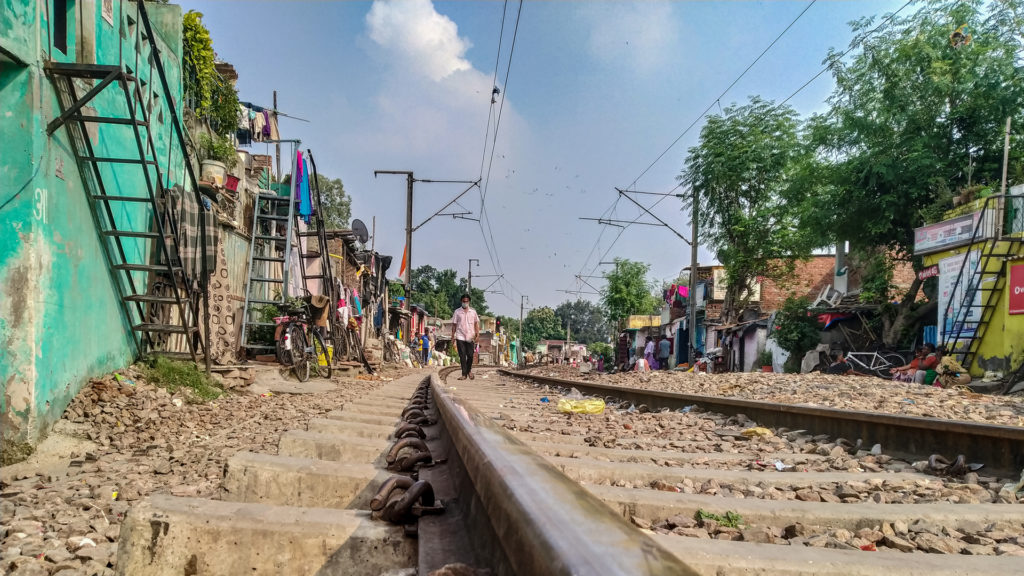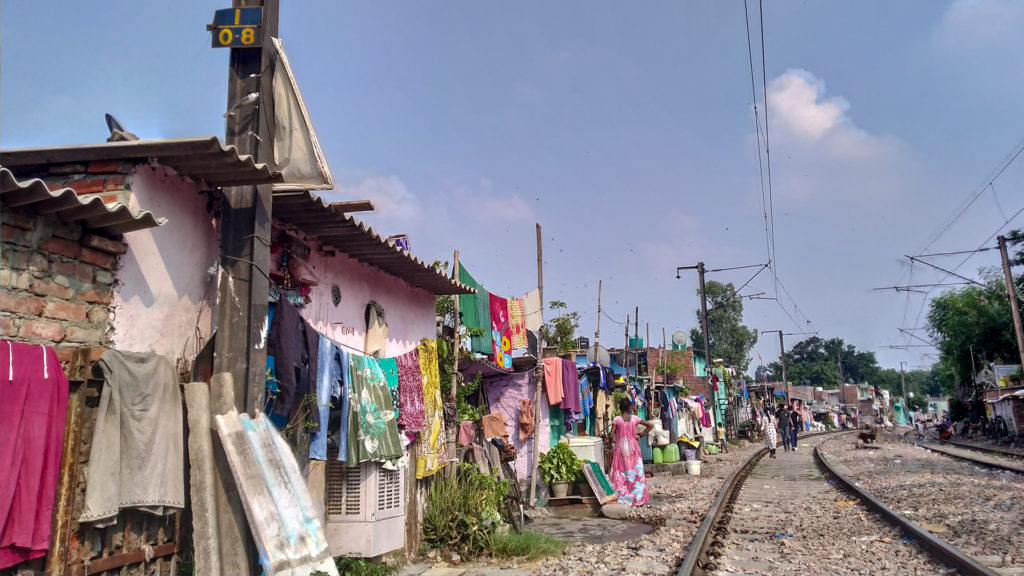Delhi slum dwellers to go to Supreme Court seeking rehabilitation

Supreme Court’s order for eviction has caught slum dwellers in Delhi, like here in Jal Vihar slum colony, by surprise (MIG Photos/Aman Kanojiya)
Delhi’s slum dwellers surprised by Supreme Court’s order for eviction of 48,000 of them living near railway tracks. The latest order also ignores India’s obligations to UNSDGs as well as Right to Housing.
A group of slum dwellers and their associations has filed an application in the Supreme Court regarding Wednesday’s order of the top court ordering eviction of 48,000 slum dwellers on railway land in New Delhi within three months. In order to avoid any kind of political interference and to ensure compliance of its order, the Supreme Court also barred any court from passing an order of stay against such removal.
The slum dwellers’ application urges the Supreme Court to order rehabilitation of the slum dwellers before they are evicted. ‘‘The court has given three months for the eviction and we are saying that three months are sufficient for rehabilitation, if undertaken seriously,’’ says a representative of an NGO working for housing rights and which will join the plea.
‘‘We have approached the Supreme Court saying that when the order was passed, consideration was not given to the Right to Housing law in India. There are dozens of orders of Supreme Court itself that have laid down two principles clearly. One is that you can not evict slum dwellers from public land unless you require that land for some public purpose. Secondly, if you evict them you ought to rehabilitate. There is also a Delhi High Court order in Ajay Maken vs Union of India in 2019 which is dot on point, telling National Green Tribunal (NGT) that if you decide to evict people, before you can move them, you got to rehabilitate them,’’ Ali Zia Kabir Choudhary, a land rights advocate in New Delhi who is helping the slum dwellers in the case, tells Media India Group.
Most of the slum dwellers, their associations as well various lawyers were caught totally unawares by the order. ‘‘I first came to know of this case only when we saw the newspaper reports after the order was passed and we were wondering about how such an order could be passed by the Supreme Court,’’ says Choudhary.
Sundrama, 45, who has been a resident of Jal Vihar slum colony in southern New Delhi for the past 35 years is one of the many residents who was clueless about the Supreme Court’s order. “If they break our jhuggis (slums), where are we supposed to go? At a time when because of coronavirus we don’t have work or ration in our house, how are supposed to find another accommodation for ourselves?”, she asks.
Sundrama says that the government has not spent a single penny for their welfare. “We buy our own food, we take care of all our needs, the government has never bothered about us. Even the construction of the roads in our colony has been done by us. We even contributed money and got water pipes installed in our area. I used to work as a domestic help before lockdown but now our employers don’t want us to come due to coronavirus. Some of us in the colony got to know about the notice yesterday but more than half of them got to know about it only today,” Sundrama tells Media India Group.

Thousands of people live along the railway tracks in New Delhi
“One is deeply disappointed and distraught beyond measure by the hasty order of the Supreme Court. This order was made without giving the affected parties notice. This is surprising because the jhuggis along the railway tracks are covered by the recent decision of a Division Bench of the Delhi High Court in Ajay Maken v. Union of India, WPC(C) 11616/2015, dated 18.03.2019 where the High Court categorically directed that all the jhuggi dwellers near the railway tracks must be rehabilitated according to the policy framed by the DUSIB long back. Since, the jhuggi dwellers represented by various petitioners were deliberately not made parties before the Supreme Court, this vital policy and court order was not brought to the notice of the Supreme Court. If this order is implemented without rehabilitation, great distress will be caused to tens of thousands of families who are already in grave danger due to the spread of COVID-19,’’ Choudhary says.
The court, which was hearing an application filed in the MC Mehta case relating to Delhi pollution matters, took this step on Monday, after the Indian Railways informed the court that despite a Special Task Force constituted to remove encroachments, political interference was coming in the way of getting the jhuggis removed. An order for removal of all encroachments passed by the NGT on October 1, 2018 had led to the formation of the task force.
Choudhary says that besides dozens of previous orders by the SC making rehabilitation a precondition before eviction, the latest SC order also ignores a number of international principles and commitments made by India at the international fora. Moreover, the court ought to have taken into account statement by the UN Special Rapporteur on the role of housing in the ongoing battle against the coronavirus pandemic, he says.
‘‘The Rapporteur has said that housing has become the frontline defence against the coronavirus. Home has rarely been more of a life or death situation. Another UN report tabled before the General Assembly in 2019 states that when courts approve evictions without ensuring alternative accommodation or fail to provide remedies for violations of the right to life caused by homelessness, they violate international human rights and the rule of law and, in so doing, place the State in non-compliance with its international human rights obligations. In the present case, the court has not approved but directed the evictions!” Choudhary adds.
Incidentally, housing for all has been promised by various Indian Prime Ministers in the past and current incumbent Narendra Modi has also promised housing for all by 2022. Housing is one of the key goals under the United Nations Sustainable Development Goals that lists numerous basic facilities for all human beings by 2030 and to which India has been a signatory right from the 1990s.
Choudhary has also represented Delhi-based law and human rights NGO, Human Rights Law Network, in several cases. He questions the railway officials’ handling of this case. ‘‘Often, the public authorities behave in a socially-irresponsible manner. Before the Delhi High Court passed the order last year, Railways had been saying that they needed that particular bit of land occupied by slums urgently for an important project of public good. But ever since the order was passed and now it is over 18 months and they have not rehabilitated a single person of that particular slum. So, where had the urgency gone all this time?’’ asks Choudhary.









